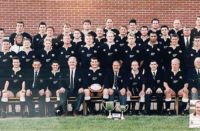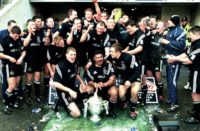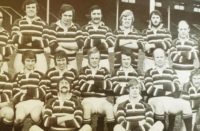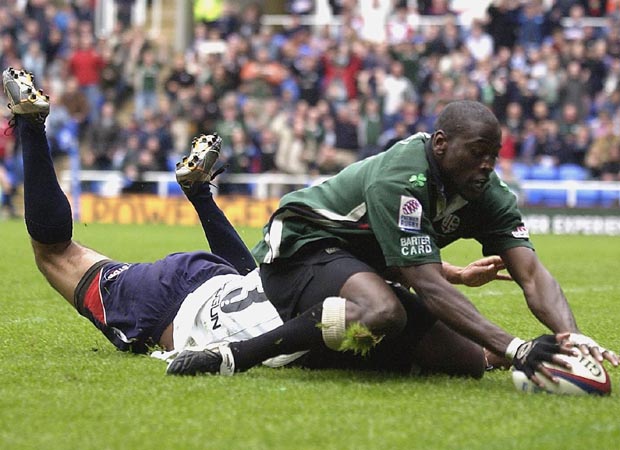 It would be no exaggeration to say that the future of London Irish was at stake. Powergen Cup winners and fourth in the Zurich Premiership the previous season, the Exiles had entered the 2002-03 campaign full of vim and vigour, planning to improve and with Heineken Cup rugby to look forward to.
It would be no exaggeration to say that the future of London Irish was at stake. Powergen Cup winners and fourth in the Zurich Premiership the previous season, the Exiles had entered the 2002-03 campaign full of vim and vigour, planning to improve and with Heineken Cup rugby to look forward to.
However, despite recording notable European wins over Edinburgh, Newport and the mighty Toulouse, poor league form meant they became embroiled in a desperate battle against relegation that also involved Bath and Bristol, who had themselves been the subject of merger talks.
Irish's position was exacerbated by a last-gasp midweek loss at Bath, followed by a dismal home defeat at the hands of Leeds Tykes, meaning the Exiles went into their last two matches, away at Leicester and home to Bristol, knowing their future as a professional entity was in the balance. Promotion and relegation was a hot topic at the time, with Premiership ring-fencing very much on the agenda, and Exiles managing director Conor O'Shea had made no bones about the fact that relegation could potentially send Irish spinning towards oblivion. It was that bad.
“It was hard to comprehend really,” recalls then-fly-half Mark Mapletoft, who had arrived from Gloucester at the beginning of the season. “The club had just won the Powergen Cup and we went on to beat Toulouse, so the position we found ourselves in was unbelievable after expectations had been so high.
“But things just hadn't been working for us in the league and after losing at Bath, we got absolutely drilled in the first half by Leeds before losing 26-14. Things couldn't have been any worse with Leicester coming up, but we went to Welford Road with nothing to lose.
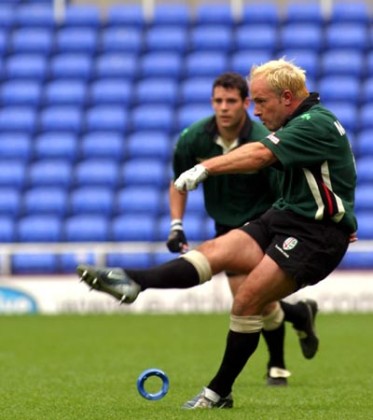
“They were virtually unbeatable at Welford Road but Brendan Venter, our player-coach, made big changes to our backline by bringing me, Hentie Martens, Geoff Appleford, Rob Hoadley and Kevin Barrett back and we came up with a load of new plays in the week before the match, which Brendan had never done before. But it worked.
“We threw all these different things at Tigers, posed them a load of problems and somehow managed to turn them over 20-19. It was a result from nowhere really but it gave us a lifeline and turned out to be crucial at the end of the day.”
Still there was work to do and London Irish went into their last day fixture with Bristol knowing that only a victory would suffice. The doom clouds were still hovering and in his programme notes for the game, Exiles chairman Brendan Mullin wrote tellingly: “From a business perspective there is too much at stake. As a new industry, professional rugby union is much too young for anyone investing in the business to be able to achieve a return… the current structure of the Premiership does not facilitate that. Some analysis of the ‘lease' a Premiership club has on its place in the league needs to be undertaken.”
In other words, Irish were facing a wholly uncertain future.
“You can't imagine a bigger game,” says Mapletoft. “I'd played in something similar for Gloucester against Saracens in 1996 and that experience proved invaluable, but I remember looking at Bristol's team which contained names like Pichot, Contepomi, Sheridan, Lipman and Gibson, thinking, ‘God, they've got some good players!'
“We got to the Madejski Stadium and normally we had a meeting on the field, but this time we went to a meeting room and the coaches had put this iconic video together which was a play on the Al Pacino speech in Any Given Sunday, except it was cut to a London Irish theme.
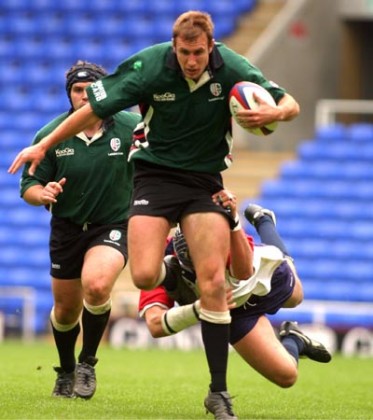
“It was brilliant, very motivational, and the boys were absolutely buzzing, thinking we were going to be brilliant. But after five minutes we were 10-0 down!”
What followed goes down in the annals of London Irish history as, led by captain Ryan Strudwick and fired by Bob Casey and Declan Danaher, Irish proceeded to rip Bristol apart.
Mapletoft produced a man-of-the-match display and tries by Naka Drotske, Hoadley, Appleford, Paul Sackey and Mike Horak secured the victory that ensured survival. Tears were shed equally in the aftermath as Bristol accepted their relegation and the Exiles celebrated wildly.
Mapletoft added: “We had the mother of celebrations and it was purely down to the range of highs and lows we'd been through. But on the day we played sublime rugby and were pretty much unplayable.
“I didn't miss a kick at goal and although they got a few points back at the end, it turned into a very one-sided game. It was one of those days when everything clicked and when people talk about getting into the zone in big games, we were just on it. I've a few special rugby memories and that's one of them.”
Irish would live to fight another day.
The Class of 2003
1. Mike Worsley: Joined Harlequins in 2003, but was forced to retire through injury in 2006. Worked as an investment banker but now teaches at Marlborough College.
2. Naka Drotske: Returned home to South Africa in 2004, where he played for and coached the Free State Cheetahs. He is now head coach of the Super 15 franchise.
3. Rob Hardwick: Left London Irish in 2005 and turned out for Richmond before becoming director of rugby at Bedford Modern School. Also coached at Luton RFC.
4. Ryan Strudwick: Joined Connacht in 2006 before returning home to enjoy a successful four-year stint coaching at the Sharks. Now coaching at Maritzburg College.
5. Bob Casey: Retired in 2012 to work for club sponsors Powerday, but is now also back at Irish as chairman of the club's recently formed rugby committee.
6. Declan Danaher: Recently retired and is now working for the club's academy along with other former Irish players Nick Kennedy and Paul Hodgson.
7. Kieron Dawson: Joined Ulster in 2006 before retiring in 2009. Returned to England where he has been head coach of National League side Worthing since 2011.
8. Chris Sheasby: Left Irish in 2004 before coaching at Staines, Bracknell and Marlow. Is now a radio pundit and a regular on the after-dinner speaking circuit.
9. Hentie Martens: Joined Bath for a short spell in 2003 before coaching at Cleve and Chippenham until 2010. Now believed to be back in South Africa.
10. Mark Mapletoft: Retired in 2005 and joined Saracens' academy before going on to be head coach of England U20s. Became skills coach at Harlequins in 2010.
11. Kevin Barrett: Joined Exeter in 2004, then rejoined Chiefs in 2011 after two years at Saracens. Is now a conditioner at Sarries and player-coach at Ampthill.
12. Rob Hoadley: Joined Wasps in 2004 where he later became defence coach. Moved to Japan in 2012 where he coaches the Ricoh Black Rams.
13. Geoff Appleford: Joined Northampton in 2007 but was forced to retire two years later. Went into software solutions and has worked for the RFU.
14. Paul Sackey: Joined Wasps in 2005 and was capped by England. Moved to Toulon in 2010 and played for Stade Francais and Harlequins before retiring this summer.
15. Michael Horak: Joined Treviso in 2007, then Saracens before retiring in 2010. Coached Super 15 side Cheetahs and is now defence coach of Eastern Province.
Replacements
Neal Hatley (for Worsley 45): Retired in 2007 and became academy manager at Irish, before joining Bath as forwards coach in 2012.
Adrian Flavin (for Drotske 80): Joined Connacht in 2006 where he played until 2013. Is now director of rugby at Castleknock College.
Simon Halford (for Hardwick, 45): Left Irish in 2003 and is now back in New Zealand, where he coaches at Havelock North Rugby Club, Hastings.
Keiran Roche (for Casey 72): Retired in 2012 and now works in the City for insurance firm Aviva.
Barry Everitt (for Hoadley 56): Joined Northampton in 2007, retired in 2010 and became director of sport at Cranmore Preparatory School. Now on Exiles' rugby committee.
Ed Thrower (for Horak 80): Had spells with Wasps, Saracens, Crociati Parma, Bedford and London Welsh and Cambridge. Current whereabouts unknown.
NEALE HARVEY
*This article was first published in The Rugby Paper on July 27.


